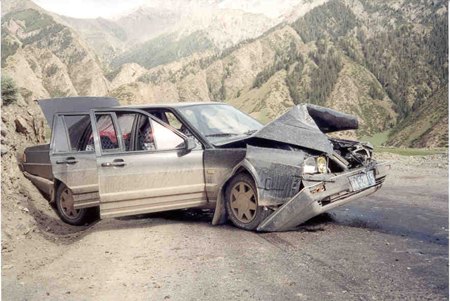26 Views
Chinese Automobile Quality Sucks
by
Frank Williams
(IC: employee)
Published: July 27th, 2007
Share
As US automakers get cozier with their Chinese counterparts, the quality of PRC-produced cars has become a topic of debate/concern. And for good reason. According to Daily Report, a recent customer satisfaction survey in China shows that 77 percent of new car owners reported problems. The report, which would make JD Power's mob weep (or salivate), revealed 338 problems for every 100 vehicles across the industry. China has no equivalent to our Consumer Product Safety Commission, so the only way consumers there have to learn about hazardous products is word-of-mouth. This is not the kind of culture you'd naturally associate with building safe, reliable vehicles for the U.S. market, Just sayin'.
Frank Williams
More by Frank Williams
Published July 27th, 2007 10:58 AM


































Comments
Join the conversation
"But of course some nanny state will step in and ruin this experiment" The experiment with contaminated pet food was great. How do Americans know they don't want their pets poised unless we try it?
My dog was poisoned. I thoroughly enjoyed taking him to the vet. Where the hell do I sign up for class action?
PCH101: The Great Depression wasn't caused by a lack of regulation or lack of government interference in the economy. Probably, quite the opposite. It was caused by an omission of implementing regulations, bad economic theory implemented in regulations and legislation, a consumer confidence crises, and just plain bad luck. The net effect was to contract GDP in real terms and bring massive deflation to the economy. The side effects were runs on banks, unemployment and low economic growth for about 15 years. E.g., as monetary stock contracted (banks allowed people to remove deposits faster than then could receive cash from creditors) the Fed didn't meet its obligation to supply more currency and in a fractional reserve system banks called loans and asset prices deflated as people sold assets at substantial losses. The Smoot-Hawley Tariff Act taxed imports and effectively taxed exports as other countries retaliated with reciprocal tariffs; causing the value of inventories to deflate to accommodate the cost of the tariffs on imports and exports. Consumers had no faith that their personal prospects would improve any time soon so they withheld consumer spending and further deflation occurred. The plain bad luck was a drought that simultaneously pushed people from farms into cities while increasing the cost of food staples. The net effect was to expand the size of the workforce while manufacturers and service industries were contracting their employment roles to manage reduced consumer demand. The current economic conditions are because regulation has diminished over the intervening 70+ years from the socialist experiments of the 30's, 60's and 70's. The Fed has removed itself from trying to manage employment levels and most kinds of regulation except for enforcing good lending practices, bank reserve policy, and maintaining a policy of steady price levels. The Congress has reduced regulation especially as related to consumer demand (e.g., taxes) and successive Congress have minimized the introduction of new regulation. Lastly, people are confident in their personal prospects; and despite China's nascent ascendancy, the US consumer still drives the majority of the worldwide economy. There is an easy free-market way for importers of Chinese goods to fully account for their presumably 'bad' quality. Consumers should demand that importers and retailers have sufficient assets to insure their product quality from bad performance and early end-of-life. Consumers are pretty savvy; and if you are stupid enough to climb into a rusting deathtrap; who am I to tell you that you won't survive a collision with my nice German car?